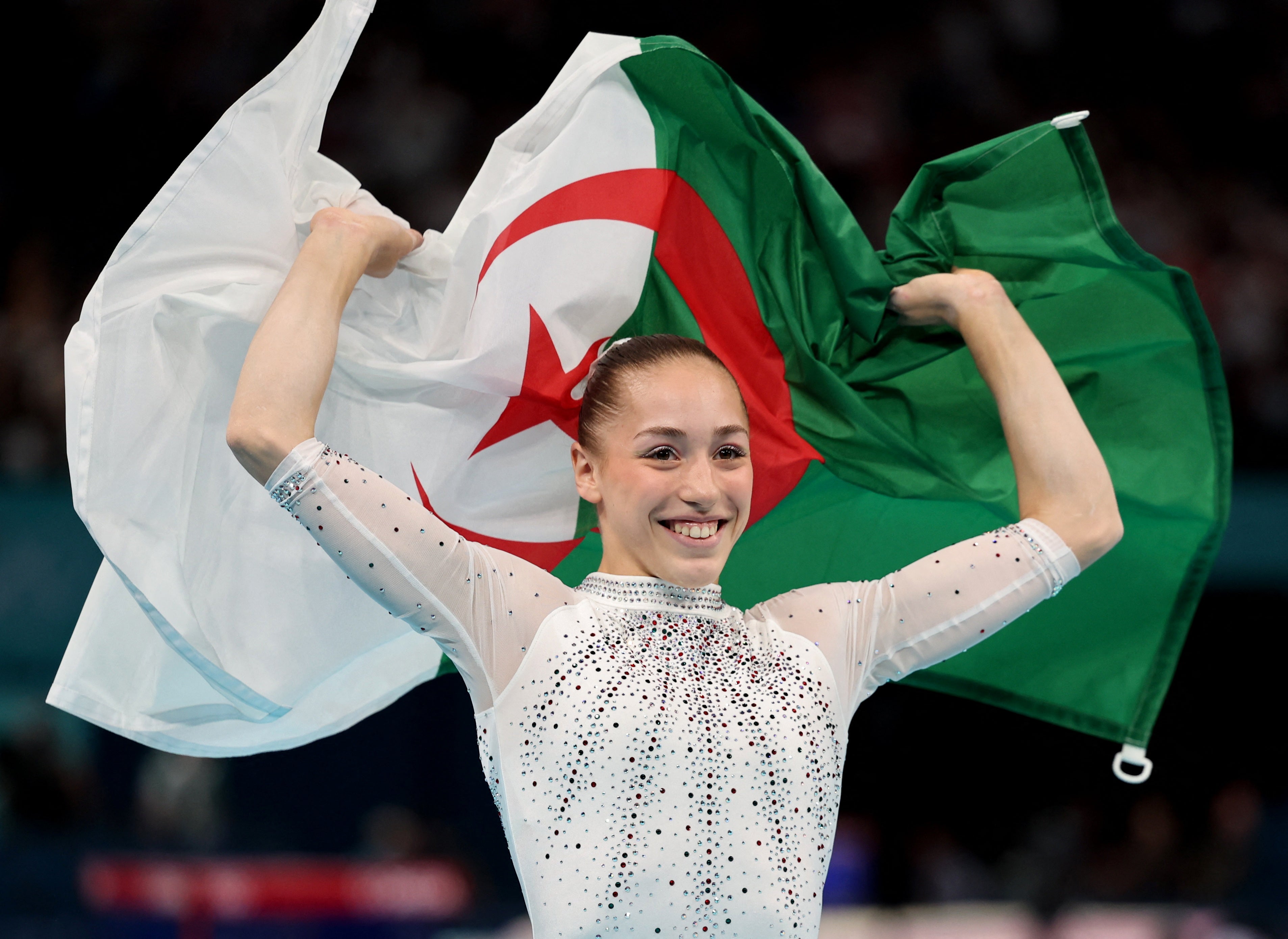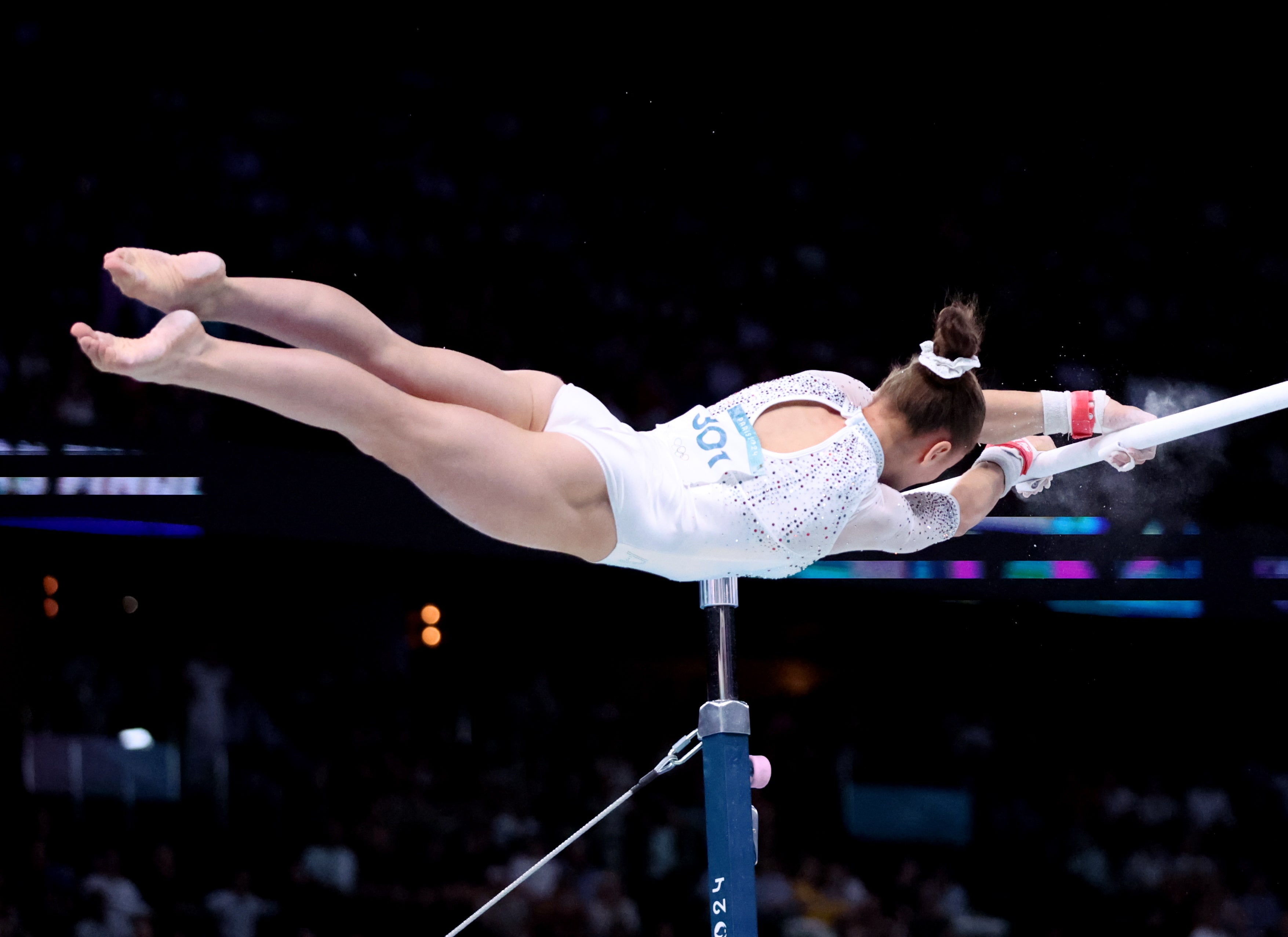‘The routine of my life’: France’s lost star Kaylia Nemour wins historic Olympic gold for Algeria
Nemour switched national allegiance last year after a dispute with French authorities. Now she is the first African to win an Olympic gymnastics medal

Your support helps us to tell the story
From reproductive rights to climate change to Big Tech, The Independent is on the ground when the story is developing. Whether it's investigating the financials of Elon Musk's pro-Trump PAC or producing our latest documentary, 'The A Word', which shines a light on the American women fighting for reproductive rights, we know how important it is to parse out the facts from the messaging.
At such a critical moment in US history, we need reporters on the ground. Your donation allows us to keep sending journalists to speak to both sides of the story.
The Independent is trusted by Americans across the entire political spectrum. And unlike many other quality news outlets, we choose not to lock Americans out of our reporting and analysis with paywalls. We believe quality journalism should be available to everyone, paid for by those who can afford it.
Your support makes all the difference.Kaylia Nemour wound up for her dismount, and the crowd held its breath in the way a gymnastics arena does at the end of a flawless routine that has one last hurdle to overcome. She gathered speed and launched into the air before somersaulting twice in pike and landing with the faintest hop. If this wasn’t perfection on the uneven bars, it was the next best thing. She raised her arms and burst into tears.
Few Olympians in Paris this week have begun a final under this much pressure. Nemour was not just the overwhelming favourite on the uneven bars but carried the expectations of two countries and one continent on her shoulders. She was born and raised in France, and still lives and trains near her small town, Saint-Benoit-la-Foret. But last year she switched to represent her father’s nation, Algeria, after a dispute with French Gymnastics.
A few moments later her gold medal was confirmed. She unfurled an Algerian flag and wrapped herself up in the white and green colours, and the Parisian crowd greeted her like one of their own. Nemour is the first Algerian woman to win an Olympic gold medal for 24 years. She is the first African gymnast to win a medal in the history of the Games.
It was a mesmerising performance in an absorbing event. The inventor of the asymmetric bars was obviously a maniac because it has no place in sane sport. Balancing on a beam? Makes sense. Performing a routine to music? Sure. Swinging around a bar into a vortex of speed before leaping through thin air to try and catch another bar? OK… hold on, what?
As if to underline the point, the final started with China’s Zhang Yihun falling hard while attempting a high-tariff spin and catch. Britain’s Becky Downie suffered the same fate in what is almost certainly her final Games, and having missed Tokyo following the tragic death of her brother. A career that includes Commonwealth and European titles will end without the Olympic medal it richly deserves.
The reigning Olympic champion, Belgium’s Nina Derwael, set an early target with a score of 14.766, but that was soon eclipsed by the world champion, China’s Qui Qiyuan, who executed a routine with a difficulty value of 7.2, the highest of any athlete on any apparatus yet at the Games, to score 15.500.
Nemour’s routine matched that difficulty, which meant she needed to beat Qui’s execution for gold. “When I saw the score of the Chinese, I said to myself that I will have to go there and bring out the routine of my life,” she said.

In the seconds before she began, Nemour took a few deep breaths. She chalked her hands while her coach Marc Tcherlinko, who discovered her at a young age in her local gym, gave her one final pep talk. Then she ran and leapt into her routine, and from there on she was in her own bubble, oblivious to the roars of “allez!” echoing around the hall.
“That is what I did. I got the best score of my life.”
Her score, 15.700, was reward not just for her performance but for what she had been through to get to the Games.
Somewhere up in the VIP boxes, some executives of French Gymnastics wearing soft shoes and crisp polo shirts were probably watching on, wondering how such a prodigious talent got away. Her dispute with the national federation began as she recovered from knee surgery, aged 14. French Gymnastics blamed her local club, Avoine Beaumont, for overtraining the young star and banned her from resuming competition. The Federation told her to leave her club in the west of France and move her base to Paris.
Nemour said no. She applied to switch to Algeria, the country of father, who embraced her with open arms. But French Gymnastics had a one-year hold over Nemour before the change was ratified, meaning she would not be able to represent Algeria in time to qualify for the Olympics. It was only when her story gained publicity that mounting pressure caused the French minister for sport, Amelie Oudea-Castera, to release Nemour from French jurisdiction.
Ten days later, Nemour won all-around gold at the African Gymnastics Championships. A year on, she is an Olympic champion.
“It [representing Algeria] was not in the plan ,” said her coach, “but life serves you some curves, some rivers you must cross. For two years she stayed focused on her goal – the Olympics. What she’s achieved is amazing.”
Nemour added: “I am very, very, very happy with what I was able to do today. I am still a little shocked, because I do not believe that I am Olympic champion on the uneven bars. It was my ultimate dream, years of work and hard work, details. I think it is really crazy and I am really honoured to have been able to win this medal, first for me and for Algeria too.”
Join our commenting forum
Join thought-provoking conversations, follow other Independent readers and see their replies
Comments